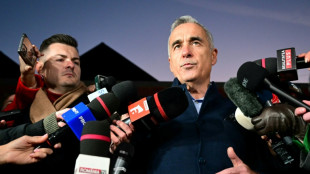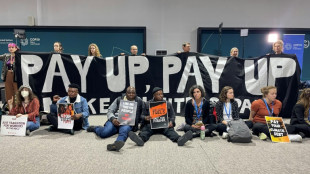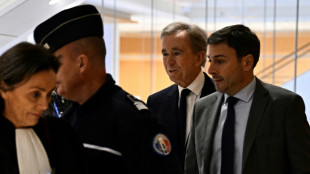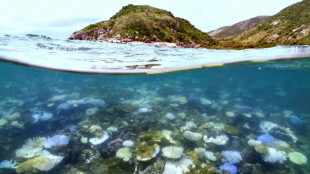
-
 Biden slams Trump tariff threats as 'counterproductive'
Biden slams Trump tariff threats as 'counterproductive'
-
TikTok tactics shake up politics in Romania

-
 'He should do comedy' says Norris of Verstappen comments
'He should do comedy' says Norris of Verstappen comments
-
Americans celebrate Thanksgiving after bitter election

-
 Flood-hit Spain introduces 'climate leave' for workers
Flood-hit Spain introduces 'climate leave' for workers
-
UK's Starmer vows to slash net migration

-
 Recount order, TikTok claims throw Romania election into chaos
Recount order, TikTok claims throw Romania election into chaos
-
Jansen stars for South Africa as Sri Lanka crumble to 42 all out

-
 Bottas set for Mercedes return as Mick Schumacher quits reserve role
Bottas set for Mercedes return as Mick Schumacher quits reserve role
-
Putin threatens Kyiv with new hypersonic missile

-
 Georgia delays EU bid until 2028 amid post-election crisis
Georgia delays EU bid until 2028 amid post-election crisis
-
French PM announces concession in bid to end budget standoff

-
 Guardiola's ingenuity will solve Man City crisis, says Slot
Guardiola's ingenuity will solve Man City crisis, says Slot
-
South Africa in control after Sri Lanka crash to 42 all out

-
 'Nothing left': Flood-hit Spanish town struggles one month on
'Nothing left': Flood-hit Spanish town struggles one month on
-
Israel conducts first strike on Lebanon since ceasefire

-
 'Unrecognisable' Mbappe and Real Madrid hurting after European woes
'Unrecognisable' Mbappe and Real Madrid hurting after European woes
-
Uber and Bolt unveil women-only service in Paris

-
 French cognac workers protest China bottling plan amid tariff threat
French cognac workers protest China bottling plan amid tariff threat
-
World tennis No.2 Swiatek accepts one-month doping suspension

-
 Suaalii to start for Wallabies against Ireland
Suaalii to start for Wallabies against Ireland
-
Farrell backs youngster Prendergast at fly-half for Aussie Test

-
 Suualii to start for Wallabies against Ireland
Suualii to start for Wallabies against Ireland
-
Camavinga joins Real Madrid injury list

-
 Australia passes landmark social media ban for under 16s
Australia passes landmark social media ban for under 16s
-
Nigerian president woos French investment on state visit

-
 Contentious COP29 deal casts doubt over climate plans
Contentious COP29 deal casts doubt over climate plans
-
PSG, Real Madrid toil as giants struggle to get to grips with new Champions League

-
 Lampard appointed manager of 'ambitious' Coventry
Lampard appointed manager of 'ambitious' Coventry
-
Liberian ex-warlord Prince Johnson dies aged 72

-
 K-pop band NewJeans leaves label over 'mistreatment'
K-pop band NewJeans leaves label over 'mistreatment'
-
Sri Lanka crash to record low Test total of 42 in South Africa

-
 Putin says barrage 'response' to West-supplied missiles
Putin says barrage 'response' to West-supplied missiles
-
Lebanon MPs seek end to leadership vacuum with January presidency vote

-
 Eurozone stocks lift as French political stand-off eases
Eurozone stocks lift as French political stand-off eases
-
French farmers wall off public buildings in protest over regulations

-
 France says ready for budget concessions to avert 'storm'
France says ready for budget concessions to avert 'storm'
-
Lampard appointed Coventry manager

-
 French luxury mogul Arnault defiant at ex-spy chief trial
French luxury mogul Arnault defiant at ex-spy chief trial
-
South Africa bowled out for 191 against Sri Lanka

-
 'Europe's best' Liverpool aim to pile pain on Man City
'Europe's best' Liverpool aim to pile pain on Man City
-
Hezbollah under pressure after war with Israel

-
 OPEC+ postpones meeting on oil output to December 5
OPEC+ postpones meeting on oil output to December 5
-
Zelensky slams Russia's 'despicable' use of cluster munitions in energy strikes

-
 One dead, thousands displaced as floods hit southern Thailand
One dead, thousands displaced as floods hit southern Thailand
-
Lebanon army deploys under Israel-Hezbollah ceasefire

-
 Imran Khan's wife Bushra Bibi emerges as Pakistan protest figure
Imran Khan's wife Bushra Bibi emerges as Pakistan protest figure
-
COP16 biodiversity talks to restart in February: UN

-
 Iran to hold nuclear talks with three European powers
Iran to hold nuclear talks with three European powers
-
French govt ready for budget concessions to avoid financial 'storm'


Tourists return but Easter Islanders draw lessons from Covid isolation
During more than two years of the coronavirus pandemic, Easter Island was closed to tourism -- forcing inhabitants to turn to a more sustainable way of life and relearn forgotten skills.
Now that the island's borders are open once again, local people, including the Rapa Nui indigenous population, want to resist the temptation to return to their pre-pandemic lifestyle.
"The time has come that the ancients predicted," Julio Hotus, a member of the Easter Island council of elders, told AFP.
Hotus said the Rapa Nui people's ancestors had warned about the importance of maintaining food independence because of the risk the island faced of one day becoming isolated, but that recent generations had ignored the warnings.
Before the pandemic, the island's food supply was almost exclusively provided by Chile.
Easter Island lies 3,500 kilometers (2,100 miles) off the west coast of Chile and is world renown for its monumental statues of human figures with giant heads, called moai.
With a population of just 8,000, it used to attract 160,000 tourists a year -- "an avalanche" according to Hotus -- but in March 2020 Easter Island closed its borders over Covid.
- No tourists, no income -
Olga Ickapakarati used to sell small stone moai figurines to tourists but once she was left without an income, she turned to agriculture and fishing to survive, just as her ancestors had lived before contact with European explorers.
"We were all left with nothing, we were left in the wind .... but we began planting," Ickapakarati told AFP.
She took advantage of a program that delivered seeds before the island was shut off from the outside world.
Ickapakarati planted spinach, beets, cilantro, chard, celery, basil, pineapple, oregano and tomatoes.
What she didn't eat, she shared with neighbors, just as many families did in creating an island-wide support network.
"All the islanders are like this. They have good hearts. If I see that I have a surplus of something, I give it to another family," said Ickapakarati, who lives with her children and grandchildren.
This new focus on sustainable living does not mean an end to tourism on Easter Island.
Last week, the first airplane of tourists for 28 months landed on the island, to much excitement from the locals desperate to see new faces.
But there will be no immediate return to the two flights a day of yesteryear. There will be just two a week for now, although the number will gradually increase.
Large hotel chains have decided to stay closed.
"We will continue with tourists, but I hope that the pandemic has taught a lesson that we can apply for the future," said Hotus.
- 'Archeological heritage at risk' -
Another thing the pandemic did was to create awareness of the necessity to look after natural resources affected by climate change, such as water and energy. And also the emblematic moais.
Carved from volcanic rock by the Polynesian Rapa Nui people between 1200 and 1500, there are more than 900 on the island, which measures 24 kilometers by 12 kilometers.
The statues can measure up to 20 meters in height and weigh more than 80 tons.
Most remain at the quarry where they were originally carved but many others were carted to coastal areas to look inland, presumably for ceremonial purposes.
The moais have been damaged by heavy rainfall, strong winds and the ocean waves crashing against the statues and their bases, leading to fears for their future.
"Climate change, with its extreme events, is putting our archeological heritage at risk," said Vairoa Ika, the local environment director.
"The stone is degrading" and needs to be protected.
"The problem with the moais is that they are very fragile," added Pedro Edmunds Paoa, the island's mayor, who says the statues' worth is "incalculable."
He said that authorities need to "forget about the tourist" vision and take protective measures, even if that means covering the statues "with glass domes", which would ruin not just the authentic view but also tourists' photographs.
He also wants inhabitants to make maximum use of natural resources and to prioritize locals in employment, while resurrecting the ancestral practise of fostering community solidarity.
"From now on the tourist must become a friend of the place, whereas before they were visiting foreigners," said Edmunds Paoa.
F.Pavlenko--BTB
